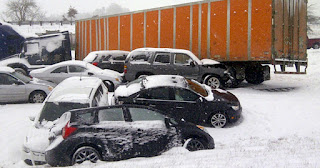 |
| This is Portland in a snowstorm. Not pretty. |
Evie had an exhausting trip out to Oregon by air that began at 10:30 a.m. on Tuesday when she left for Richmond. She flew out of Richmond, made it to Newark, N.J., had a brutally long layover and then departed for Portland. Only to have her flight rerouted to Seattle due to heavy snow that socked in PDX. She eventually made it to Portland in the middle of the night but was stranded at the airport.
It's a helpless feeling knowing my daughter is stranded 3,000 miles away after a long night. The roads were nasty, we checked the MAX light rail and it looked like it was running to Clackamas Town Center and we were hoping maybe she could catch a bus to Canby, where Julie's folks live. But the buses weren't running -- everything in Portland was basically shut down amid a snowstorm dropping a foot of white stuff -- and the Tri-Met webpage recommended that after Evie got to Clackamas Town Center she walk the 7.8 remaining miles to Canby. In a blizzard. With her luggage.
Um, no.
I was desperate. I called my good friend in Corvallis, Matt Fields. Back in 2008, in similar conditions in December, Matt had taken me from Corvallis to the airport in Portland with no problem so I could fly back to Gloucester. I wanted to get the lowdown from Matt on how bad it really was in Oregon for this go around. It wasn't good.
Matt described Interstate 5 around Portland quite ominously as a "Prius graveyard." Gulp.
Then he offered to go fetch Evie.
"I've got the Excursion, it's got studs on the tires, I'll throw some chains in the back and head up there," he said. Like it's that easy. Well, it was. For him. Truth be told, it was time to send in the `Redneck Cavalry.'
That would be Matt. He's an Oregonian through and through. Hickory shirts, chainsaws, operates heavy equipment, woodsman, marksman (just ask the deer in western Oregon), farmer, mechanic, you name it. He put the rugged in rugged individual.
He's a solid Christian brother, as solid as they come, a family man and a follower of Christ. He's willing to help out a friend in need and go rescue his daughter in an Oregon blizzard that shut down 2/3 of the state.
Within hours I had a text from Evie saying she was passing through Woodburn on her way to Corvallis. They were southbound on I-5, well clear of the Prius graveyard by then.
I am so thankful for friends like Matt Fields. A true redneck brother. They don't make them any better.



















